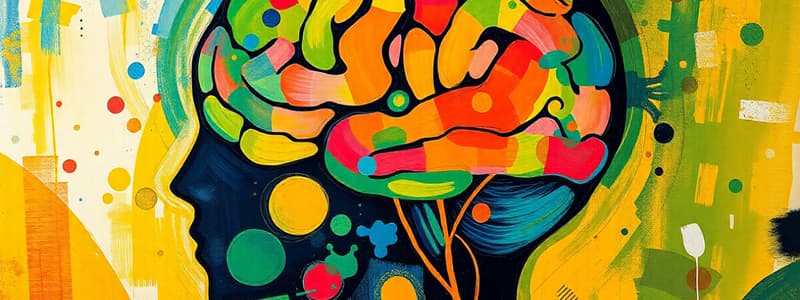Podcast
Questions and Answers
Which statement reflects the viewpoint of humanistic psychologists regarding the unconscious mind?
Which statement reflects the viewpoint of humanistic psychologists regarding the unconscious mind?
- Unconscious thoughts are always harmful to self-concept.
- Self-concept is crucial for making conscious decisions. (correct)
- Conscious decisions are irrelevant to human fate.
- Only unconscious processes govern human behavior.
What negative outcome results from the gap between ideal and actual self, according to humanistic psychology?
What negative outcome results from the gap between ideal and actual self, according to humanistic psychology?
- Enhanced decision-making capabilities.
- Development of accurate self-concept.
- Increased self-awareness.
- Pushing upsetting information into the unconscious. (correct)
What role did Santiago Ramon y Cajal play in the field of psychology?
What role did Santiago Ramon y Cajal play in the field of psychology?
- He established the concept of unconscious processes.
- He was the first to describe neurons. (correct)
- He focused on the importance of conscious decisions.
- He developed theories on sociocultural influences.
What does the sociocultural perspective in psychology emphasize?
What does the sociocultural perspective in psychology emphasize?
What concept indicates that not all members of a culture are alike?
What concept indicates that not all members of a culture are alike?
Which statement is true about the biological aspect of human beings?
Which statement is true about the biological aspect of human beings?
What idea is promoted by the sociocultural perspective regarding cultural differences?
What idea is promoted by the sociocultural perspective regarding cultural differences?
Which of the following is NOT one of the baseline information about behavior stated in the context?
Which of the following is NOT one of the baseline information about behavior stated in the context?
Abraham Maslow, Carl Rogers, and Victor Frankl believed that human beings determine their own fates through ______ decisions.
Abraham Maslow, Carl Rogers, and Victor Frankl believed that human beings determine their own fates through ______ decisions.
According to humanistic psychology, most individuals have inaccurate ______ due to societal pressures.
According to humanistic psychology, most individuals have inaccurate ______ due to societal pressures.
Santiago Ramon y Cajal is known for his pioneering work in describing ______.
Santiago Ramon y Cajal is known for his pioneering work in describing ______.
The sociocultural perspective in psychology stresses that personalities are learned from ______.
The sociocultural perspective in psychology stresses that personalities are learned from ______.
The sociocultural perspective promotes the idea of ______ relativity.
The sociocultural perspective promotes the idea of ______ relativity.
Human beings are described as ______ creatures in the baseline information about behavior.
Human beings are described as ______ creatures in the baseline information about behavior.
Human lives are characterized by a continuous process of ______.
Human lives are characterized by a continuous process of ______.
Behavior is often driven by underlying ______.
Behavior is often driven by underlying ______.
Flashcards are hidden until you start studying
Study Notes
Humanistic Psychology
- Humanistic psychologists, like Maslow, Rogers, and Frankl, challenged Freud's focus solely on the unconscious.
- They emphasized conscious decisions and self-determination.
- A person's self-concept is crucial for making good decisions.
- Social influences can hinder the development of an accurate self-concept.
- Dissonance between the ideal and actual self can lead to unconscious suppression of negative information.
- This suppression contributes to inaccurate self-concepts and potential anxiety.
Neuroscience Perspective
- Santiago Ramon y Cajal pioneered the understanding of neurons in 1894.
- His work established the foundation for understanding the brain's role in psychology.
- The brain is a network of interacting neurons.
Sociocultural Perspective
- The sociocultural perspective acknowledges both the universality and diversity of human experience.
- It emphasizes the influence of social learning on personality, beliefs, attitudes, and skills.
- This perspective combats the misconception of universal human sameness.
- The sociocultural perspective promotes cultural relativity:
- Different cultures are not necessarily "better" or "worse."
- Individuals within a culture can be more diverse than individuals across cultures.
Fundamental Principles of Behavior
- Humans are biological beings with fundamental biological needs.
- Every person is unique but we share common characteristics and needs.
- Social and cultural context play a crucial role in understanding human behavior.
- Human development is an ongoing process of change.
- All behavior is motivated by underlying drives or desires.
Humanistic Psychology
- Abraham Maslow, Carl Rogers, and Victor Frankl disagreed with Freud's emphasis on unconscious processes.
- They believed humans have conscious control over their destinies, but unconscious factors can hinder good decisions.
- Self-concept is crucial for making good conscious choices, but societal influences make accurate self-perception difficult.
- Discrepancies between the ideal and actual self are often pushed into the unconscious, leading to inaccurate self-concepts and anxiety.
Neuroscience Perspective
- Santiago Ramon y Cajal's 1894 discovery of neurons revolutionized our understanding of the brain's role in psychology.
- His work laid the foundation for the modern neuroscience perspective, highlighting the interconnectedness of neural cells in the brain and nervous system.
Sociocultural Perspectives
- The sociocultural perspective emphasizes the unique and shared aspects of human experience.
- It acknowledges that while humans share fundamental similarities, they also differ significantly due to social and cultural influences.
- This perspective is rooted in social learning theory, recognizing the impact of social interaction on personality development.
- Cultural relativity, a key component of the sociocultural perspective, suggests that cultures differ in relative, not judgmental, terms.
- It also emphasizes the importance of recognizing individual differences within cultural groups.
Baseline Information About Behavior
- Human behavior is shaped by biological factors.
- Every individual is unique while also sharing commonalities with others.
- A complete understanding of behavior requires consideration of cultural and social influences.
- Human experiences are continuously evolving and changing.
- Behavior is driven by underlying motivations.
Studying That Suits You
Use AI to generate personalized quizzes and flashcards to suit your learning preferences.




